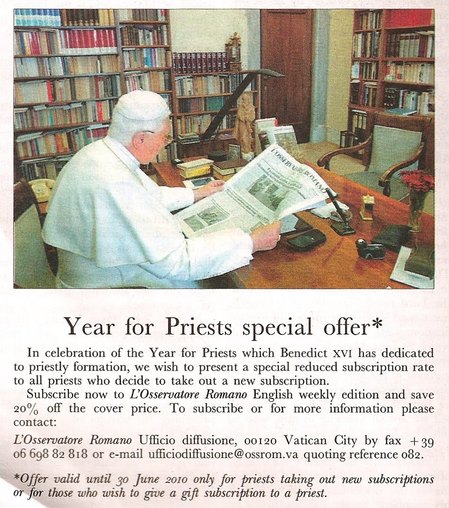Father Julián Carrón, published the following commentary on priesthood in the L’Osservatore Romano (June 9, 2010), at conclusion of the Year of Priest.
I will never forget the impact of a question at a spiritual retreat with some priests in Latin America. I had just finished saying that often our faith lacks the human, when a priest approached me and said that when he was in seminary, they taught him that it was better to hide his concrete humanity, not to have it in sight “because it disturbed the journey of faith.” This episode made me more aware of how Christianity can be reduced and of the state of confusion in which we are called to live our priestly vocation. Once someone asked Fr. Giussani his advice for a young priest, “That he be above all a man,” he answered, to the surprise of those present. We find ourselves at the polar opposite of the advice given the seminarian: on the one hand, to look away from one’s humanity, and on the other, a gaze full of fondness for oneself.
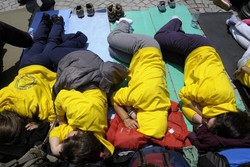
So then, what is decisive for our faith and our vocation? What do we need? Fr. Giussani repeatedly indicated that “the forgetfulness of the ‘I’,” the absence of authentic interest for one’s own person is the “supreme obstacle to our human journey” (Alla ricerca del volto umano, Rizzoli, Milano 1995, p. 9). Instead, true love for oneself, true affection for oneself is what leads us to rediscover our constituent exigencies, our original needs in their nakedness and vastness, so as to see ourselves as relationship with the Mystery, entreaty for the
infinite, structural expectant awaiting. Only people so “wounded” by reality, so seriously engaged with their own humanity can open themselves totally to the encounter with the Lord. Fr. Giussani affirms, “In fact, Christ offers Himself as the answer to what “I” am and only an attentive and also tender and passionate awareness of myself can throw me wide open and dispose me to acknowledge, admire, thank, and live Christ. Without this awareness, even that of Jesus Christ becomes a mere name” (At the Origin of the Christian Claim, McGill-Queen’s University Press, Montreal 1998, p. 4).
“There is no response more absurd than that to a question one hasn’t asked” wrote Reinhold Niebuhr. This also applies to us when we uncritically submit to the influence of the culture in which we are immersed, which seems to favor the reduction of humanity to our biological, psychological and sociological antecedents. But if humanity is truly reduced to this, what is our task as priests? What use are we? What is the sense of our vocation? How can we resist a flight from reality, taking refuge in spiritualism or formalism, seeking alternatives that make life bearable? Or wouldn’t it be better, obeying the cultural climate, to become social assistants, psychologists, cultural operators or politicians? As Benedict XVI reminded us in Lisbon, “Often we are anxiously preoccupied with the social, cultural and political consequences of the faith, taking for granted that faith is present, which unfortunately is less and less realistic. Perhaps we have placed an excessive trust in ecclesial structures and programs, in the distribution of powers and functions; but what will happen if salt loses its flavor?” (Homily at Holy Mass at Terriero do Paco of Lisbon, May 11, 2010).
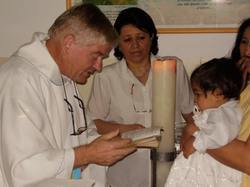
Therefore, everything depends on the perception, first of all for us, of what humanity is and what truly corresponds to our infinite desire. The decision with which we live our vocation therefore derives from the decision with which we live our being men. Only within an authentically human vibration can we know Christ and let ourselves be fascinated by Him, to the point of giving Him our lives to make Him known to others. “Why does the faith still absolutely have a chance of success?” then Cardinal Ratzinger asked himself, and answered, “I would say because it finds correspondence in the nature of man. […] In man there is an inextinguishable nostalgic aspiration toward the infinite. None of the answers sought is sufficient; only the God who has made Himself finite, to lacerate our finiteness and lead it in the breadth of His infinity, is able to meet the questions of our being. Therefore today as well, Christian faith will return to find humanity” (Fede, Verità, Tolleranza [Faith, Truth, Tolerance] Cantagalli, Siena 2003, pp. 142-143).
This certainty that Benedict XVI testifies to continually even in the face of all the evil we bring upon ourselves or cause others – just think of the pedophilia issue – invites us on a journey to rediscover and deepen our understanding of the reasonableness of the faith: “Our faith is well-founded, but this faith needs to come alive in each of us […]: only Christ can fully satisfy the profound longing of every human heart and give answers to its most pressing questions about suffering, injustice and evil, concerning death and life hereafter” (Homily at Holy Mass at Terriero do Paco di Lisbon, May 11, 2010). Only if we experience the truth of Christ in our life will we have the courage to communicate it and the audacity to challenge the hearts of the people we meet. In this way, the priesthood will continue to be an adventure for each of us and thus the opportunity to testify to our fellow women and men the answer that only Christ is for the “mystery of our being” (G. Leopardi). Thank you.
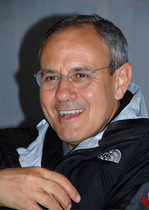
Father Julián Carrón is a priest of the Archdiocese of Madrid and he is the President of the Fraternity of Communion and Liberation centered in Milan, Italy. He was appointed by Benedict XVI to be among the experts at the Synod of Bishops on the Word of God and he is a consultant on the Pontifical Council of the Laity.
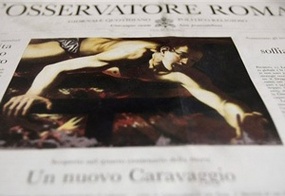 The art world is abuzz due to an article in L’Osservatore Romano on Sunday stating that a “lost Caravaggio” may now be found.
The art world is abuzz due to an article in L’Osservatore Romano on Sunday stating that a “lost Caravaggio” may now be found.


